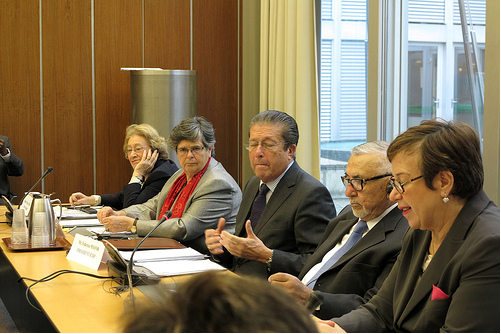

IPU Round-table discussion: Parliamentarians, a critical force in promoting the abolition of the death penalty
The IPU convened its first ever meeting to specifically address abolition of the death penalty in Geneva on 10 October 2013. The date is significant. 10 October has been World Day Against the Death Penalty since it was designated as such by the World Coalition Against the Death Penalty in 2003. I attended the event as the UK delegate and Chair of the APPG on the Abolition of the Death Penalty. The co-organiser was the International Commission Against the Death Penalty (ICDP), a body founded in Spain in 2010 which brings together a number of distinguished abolitionists who have held high office in governments around the world. The event was attended by delegates from Algeria, Bahrain, Belarus, Chad, Ecuador, Guatemala, Japan, Jordan, Kazakhstan, Nicaragua, Niger, Pakistan, Peru, Suriname, Switzerland and Zambia
The ICDP President and former Director-General of UNESCO Federico Mayor opened the proceedings with an overview of the state of abolition around the world. ICDP member and former President of Switzerland Ruth Dreifuss described the many different ways in which abolition is achieved in different countries. The President of the IPU, Mr Abdelwahad Radi, spoke about the IPU’s commitment to promoting human rights of which the abolition of the death penalty was an important part. I spoke on the role of parliamentarians in abolition, citing the experience of the APPG in sending members on missions from our Parliament to meet parliamentarians in countries which retain capital punishment and the benefits that flow from creating opportunities for parliamentarians from abolitionist and retentionist countries to meet and share experiences.
The other main speaker was Ms Nouzha Skalli MP, a former government minister and now Deputy Co-coordinator of the parliamentary network against the death penalty in Morocco. She described the establishment of the network in the Moroccan parliament, which now had 208 members representing nearly all the parties in the parliament. The group was now active in the wider North African and Middle East area supporting the establishment of similar groups.
The discussions centred on two main topics. The difficulty of working for abolition in a climate of fear about violent crime and strong public support for the death penalty were cited in many interventions as a large deterrent to MPs to admit they are abolitionist or to campaign for abolition. Secondly the question of the use of the death penalty in Islamic countries provoked heated discussion.
I was asked to provide some concluding recommendations and my first and most important was to urge all IPU members to ensure that the IPU followed up the 10 October event with a programme of activities on abolition. I also suggested that the fear of public opinion was sometimes ill-informed and work should be done on a more nuanced analysis of the views of the public. Finally I suggested much benefit could come from closer working between abolitionist parliamentarians from all parts of the world.













